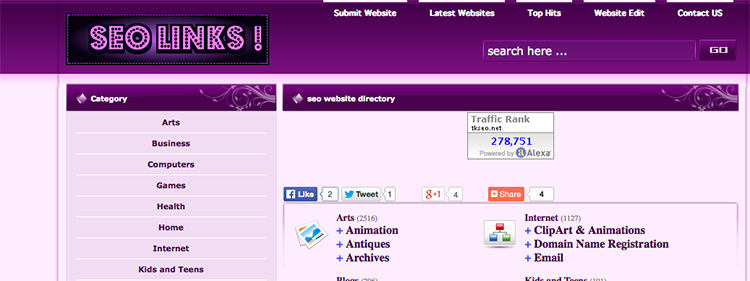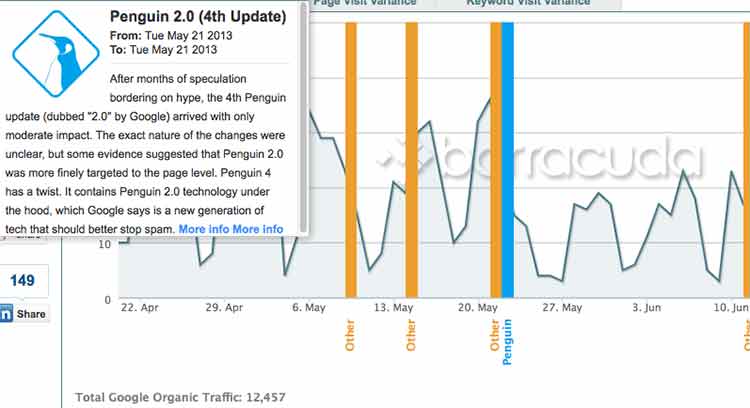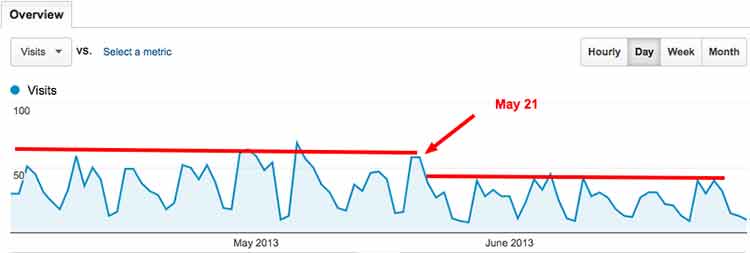Worried about the latest Penguin refresh? You’re joining a big club. Google’s cuddly little black and white non-flying bird takes frightening to a whole new level. In fact, this year for Halloween, we’re all going as Penguins. It might not scare any kids, but we’re pretty sure any business owners will pee their pants when they see a Penguin standing on their doorstep.
In order to help you better understand this scary bird, we’ve pooled together a few of our directors to have a heart to heart discussion with you about what you need to know in order to be well informed and make smart decisions regarding this latest and future updates to Google’s Penguin filter.
What is Penguin? Dax Greener, Director of Operations, Answers
Penguin penalizes spammy links. There is a bit more to the update itself; if you want to be adventurous and read Google’s exact words on the subject click here.
 Source: Cuttslol.com
Source: Cuttslol.comThis is where filters are born. Panda, Penguin and Pigeon are probably some terms you have heard your SEO company mention before. These are all attempts to better the search experience for the end user.
Why do you, the attorney, need to know this kind of stuff? Having a basic understanding of Google’s filters, especially Penguin, will allow you to ask the right questions to your SEO company and make sure you aren’t on the path to being relegated to the back pages of Google. All links weren’t created equal. Make sure you know what types of links are being pointed to your site and work with your SEO company to solidify your link profile.
A History Of Penguin: A Fairy Tale Told By Dax
Penguin was first released on April 24th, 2012. In it’s first iteration, it took targeted action on things like keyword stuffing. Reportedly, it only affected 3.1% of all search queries which is still in the neighborhood 105 Million searches. Since the initial release there have been 5 more updates or refreshes to the algorithm.
- May 25th, 2012 – Impacted less than 0.1% of search queries
- Oct 5, 2012 – Impacted about 0.3% of search queries
- May 22, 2013 – Officially named Penguin 2.0 and impacted around 2.3% of search queries
- Oct 4, 2013 – Impacted around 1% of search queries
- Oct 17, 2014 – Unlike the others, this was just a refresh of the filter, with no new signals being added. It impacted about 1% of english search queries

Each update includes new tweaks to the algorithm that Google continues to develop. Each of the Penguin releases have been updates before. It is interesting to note that they are saying this latest release is a refresh to the algorithm and not an update. Google’s Pierre Far released a statement about the refresh.
What does this mean for the future? Are we going to still see a Penguin update this year? Is Penguin going to be built into the algorithm and refresh on a monthly basis? There is a lot of speculation right now while we all wait for more information from Google. We suggest you continue to monitor things for the next few weeks while the current Penguin refresh is settling. We will have to see what Google says about things at that point. Our instinct says that we will still see a Penguin update before the new year. However, predicting what new signals they will add or when they will release it is like getting your palms read; in the end, it’s all about link spam regardless if its guest blog, bookmarks, or even citations.
So What Exactly Is Link Spam? Ryan Amen, Director of Search, Explains:
Google puts a lot of things under the umbrella of link schemes but they partly defines a link scheme as:
Any links intended to manipulate PageRank or a site’s ranking in Google search results may be considered part of a link scheme and a violation of Google’s Webmaster Guidelines.
This indicates that if you are actively doing anything to get links, it could be considered part of a link scheme. It reminds us a bit of how Yelp specifically tells business owners: “Don’t ask customers for reviews”.
One item classified as a “link scheme” that stands out & we’ve seen from a lot of SEO campaigns is large-scale article marketing or guest posting campaigns with keyword-rich anchor text links. The reason this is frowned upon is because the resulting articles are rehashes or remixes and rarely, if ever, provide anything worthwhile to the reader. We see the appeal; let’s order 75 articles from a content farm that center around car accident, stick in a link to your site with the anchor text “Los Angeles Car Accident Attorney” and BOOM rank #1 overnight. Don’t do it; all you’ll do it create a massive heartache that will result in the untimely death of your website.
Google’s quality guideline section about links goes on to talk about “unnatural links”. Below are some examples of the type of “unnatural” links we’ve commonly seen & disavowed in attempts to help clients get out from under, or avoid the negative affects of, Penguin. It isn’t uncommon for a client to come to us after a previous SEO company’s campaign resulted in ugly, dangerous links that the attorney didn’t even know existed. Here’s a few examples of dangerous link building:
- Links with optimized anchor text in articles or press releases distributed on other sites. Here are a few examples: Be aware these links don’t point anywhere on purpose as we didn’t want to penalize someone’s site.
- There are many wedding rings on the market. If you want to have a wedding, you will have to pick the best ring. You will also need to buy flowers and a wedding dress.
- Low-quality directory or bookmark site links
- Forum comments with optimized links in the post or signature, for example:
- Thanks, that’s great info – Paul paul’s pizza san diego pizza best pizza san diego
If your SEO company isn’t no-following links in press releases, you need to talk to them. If your SEO company is creating loads of bookmarks for the sake of gaining links, you need to sit down & have a serious discussion with them. If your SEO company is creating forum comments that don’t make sense or are on sites that are in a foreign language (that you don’t speak) you need to FIRE them.
Our rule of thumb is if the link doesn’t make sense for your business, then it doesn’t make sense to keep it. One last thing, sites with the words: “seo, links, free, article” in the domain, are very likely places you do not want to have a link on. For example, look at this screenshot:

Anytime a site has more than one of those spammy words (like the above)…run and don’t look back.
How Can You Tell If You’ve Been Affected By Penguin? Ryan’s How-To Guide
Figuring out whether or not you’ve been affected by an algorithmic penalty can be a bit tricky because there’s no notification in your webmaster tools to tell you if you’ve been effected by filter updates like Penguin. That’s not to say that you couldn’t be affected by a manual penalty and a filter at the same time but for this discussion, let’s look at a couple key signals to tell if you have been affected by Penguin. Manual actions will have to wait for their own post.
The first thing you’ll notice is drops in your rankings. Because Penguin’s whole purpose in life is to take an axe to link spam, if you get hit, any inflated rankings gained through spam will disappear. If you see sudden drops after an update or refresh of Penguin, the next step would be to check your Google analytics & see if you have experienced a significant traffic drop.
Our favorite tool for gaining insight into whether or not a site has been impacted by an update from Google is Barracuda Digital’s Panguin Tool. (Note: This tool will require you to log into & give access to your Google Analytics to use.)
You will gain better insight as more time goes by rather than immediately after an update. The reason for this is natural fluctuations can easily give false signals if a drop lines up with an update’s date. Sustained drops are what we’re looking for here.

If you see something like the example above, you can click your cursor to highlight a smaller section of the timeline to zoom in to get a better look. Clicking on a update line will bring up an information box about the date/details of that specific update.

Double-checking the date against your Google Analytics is also a good idea as the data sometimes looks slightly different between Panguin & Analytics.

What to Do if You’ve Been Hit? Devin Harper, Director of Outreach, Tells All
If you have determined that you were hit by Penguin, you have a long road ahead of you (at least until Google adds Penguin into their normal algorithm). Your recovery depends on several things:
- The severity and scope of the filter.
- What you’ve done to realign with Google’s Guidelines.
- How long it takes Google to refresh the Penguin algorithm.
Focus on the one thing you can control – link cleanup.
You need to remove the offending links that plague your law firm’s website. This is a painful process as you must exercise extreme prejudice towards any links that could be considered spam. You will need to create a list of links to disavow. The Disavow Tool allows you to ask Google to disavow (i.e. disregard) a set of links pointing to your site. In theory, Google will then ignore those links. The next time Google refreshes or updates Penguin, your disavow should kick in and your site should get released. We say should because there are always outstanding circumstances that could prevent you from recovering.
To create a disavow list, login to Webmaster Tools, click on “Search Traffic” and select “Links to Your Site.” At the top of the page you’ll see your total links. This will help you gauge approximately how long your cleanup may take. Remember, you must go through each domain one-by-one to determine whether or not it’s spammy – just how you wanted to spend the next 20 hours of your life, right? It’s a tricky task, since you don’t want to disavow links that are actually helping your site. Hiring an SEO expert really expedites this process, ensures that the baby isn’t thrown out with the bath water and gets you back in Google’s good graces sooner.
Expand the list that shows who links to you the most and download them. This is likely a very long list of URLs, but you can run your list of URLs through various tools out there that scrape site metrics which will help you prioritize your cleanup efforts. I wrote about one way to do that here.
After you have gone through the painstaking process of building a link list for disavowal, you’ll need to upload it to Webmaster tools under “Google Index” and “Remove URLs.” In order for this to work, however, your file type must be .txt and formatted correctly. Google lays all of that out here. After successfully creating your link removal request, you will be able to monitor the status of the request. Now sit back and relax.
How to Avoid Being Hit in the Future: A Cautionary Tale By Devin
The world of search is ever-changing, and Google is constantly trying new things and updating their algorithms. Many of the tactics used to rank law firm websites just two years ago are no longer viable. Staying on top of everything is hard, even if you subscribe to SEO blogs and study everyday. The single most important thing you can do is hire an SEO company who is transparent with you about everything they are doing on your behalf. A good company will diagnose and repair any problems in your link profile BEFORE new Penguin updates sweep through and ruin your hard-earned progress.
There are many ill-disposed agencies who employ black-hat link building tactics that game the system, leaving you with no lasting link equity and at high risk of being penalized. Google despises manipulative link building tactics, because it threatens their mission to provide users with the very most helpful, relevant information in their search engine. And it’s not just small SEO agencies that fall victim to Google’s wrath. There has been some chatter recently about large, respected, law-specific agencies getting in trouble for facilitating in their client’s penalties.
As an attorney, you know as well as anyone that when you outsource your work, you inevitably outsource your ethics. Working with a seasoned, reputable SEO agency gives you potential to develop and implement creative initiatives that both grow your online presence and protect your website and brand.
Questions To Ask Before Hiring an SEO for Law Firm Marketing
With all of that in mind, how do you find an SEO firm that will help you stay out of Google’s warpath? We’ve put together a list of questions we feel any good SEO should be able to answer.
- Do you perform link audits for new clients? This is a deal breaker if you have been affected by Penguin.
- Do you report the links you build to your clients? You’ll want to make sure that the links they are building make sense, instead of nothing but spam.
- What is the ratio of branded vs commercial anchor text of links you build? You want to see around a 90/10 split respectively.
- What is your process for link cleanup if I am under penalty? Beyond handling your disavow file, you want to see that they are reaching out to websites and asking for links to be removed.
- How do you determine a good link? You’ll want to hear that they consider domain authority, page authority, industry relevance and geographical relevance when determining the value of a link.
Hire an agency that understands your niche, and knows what it takes to build your firm, grow traffic and make meaningful connections to your market audience. Work closely with them. Strategize together, communicate often and build campaigns together that result in links being built naturally – links that make sense to the user. That’s what Google is focused on, so that’s what you should be focused on.
Why Penguin Is A Step In The Right Direction: A Summary By Lance Pincock, Director of Content
It’s a hard pill to swallow; no one wants to be told that their tactics in the past are now considered spam that will banish them to the burial ground that is the 5th page and beyond in Google search results. So why are we ending this article telling you its the right move? Simple, the more you focus on link opportunities instead of link spam, the more you will be building your brand. To paint a clear picture of why this move is important, and why you should have a surface level understanding of Google’s filters, we want to demonstrate the results of the two main strategies out there to get your site to rank.
The first example is the black hat, link spammer strategy. You build an exact match domain website, let’s use www.PortlandOregonCarAccidentAttorneysWhoWin.com as an example. Then you build a ton of link spam pointing at the domain to get it to rank. And it does, for a while. While it ranks, you get a decent amount of leads, make a lot of money, and are really happy. Then Google updates or refreshes its filters; your cash cow is now dried up and costing you a metric ton in cleanup efforts or, at least, a small fortune in setting up another domain with new content, new links, new everything.
It’s a churn and burn strategy if we ever saw one. The sad part is that is works really well. And even with Google threatening that penalties will follow you (as stated by John Mulluer), because Google is fallible, lots of spammers get away with this strategy for a long time. Regardless, we are confident that they will be caught with the price being paid by their clients.
In direct opposition to that strategy is having a real marketing plan. In place of that long exact match URL that no one will remember, you build www.NiftyAttorneys.com. Now you spend your time building relationships with news sources, schools, other attorneys, and legal speciality sites. Before long you would realize that you aren’t building links; you are doing PR work that is resulting in worthwhile relationships that will bring you business for years to come. Nifty Attorneys, LLC becomes known as “the legal firm” in your city. Previous clients recommend you to friends and family. Google loves you because you are creating amazing content, which in turn gets 100s of quality links because of your established relationships.
This is a long term strategy; you will not rank overnight. But the real question is do you want to be in business for 6 months, spending every waking minute worrying about when the bomb will hit, only to do the whole thing over again on a new domain or do you want to build a lasting business you can be proud of?
Google Penguin is helping the web become a better place by rewarding those companies that are doing real business marketing. Does Google always get it right? No. We’ve seen good law firms get hit because Penguin is just a mathematical equation; in it’s current form it looks for spam signals, which some good links exhibit as well. There is always going to be grey areas (like the penalty one man got for guest blogging on moz.com) and most sites have a long history with links from before link building was even on the owner’s radar.
The fact is Google wants to provide their users with good results from good companies. This shows that they care about what ranks in their search engine. And with filters like Penguin becoming the norm, putting your focus on real marketing instead of link spamming should be your strategy.
Have you been affected by Penguin and don’t want to deal with the headache? Give us a call at 800-381-4959 or fill out our form. We’re experienced in these matters.
Devin is the Director of Product at Nifty. With over a decade at Nifty, and even more years working in the SEO and digital marketing space, Devin has done it all – from execution to high-level strategy. He is a Google Product Expert and speaks French fluently. In his spare time, Devin enjoys fishing, playing pickleball with his wife, and cheering on his kids from the sidelines.
